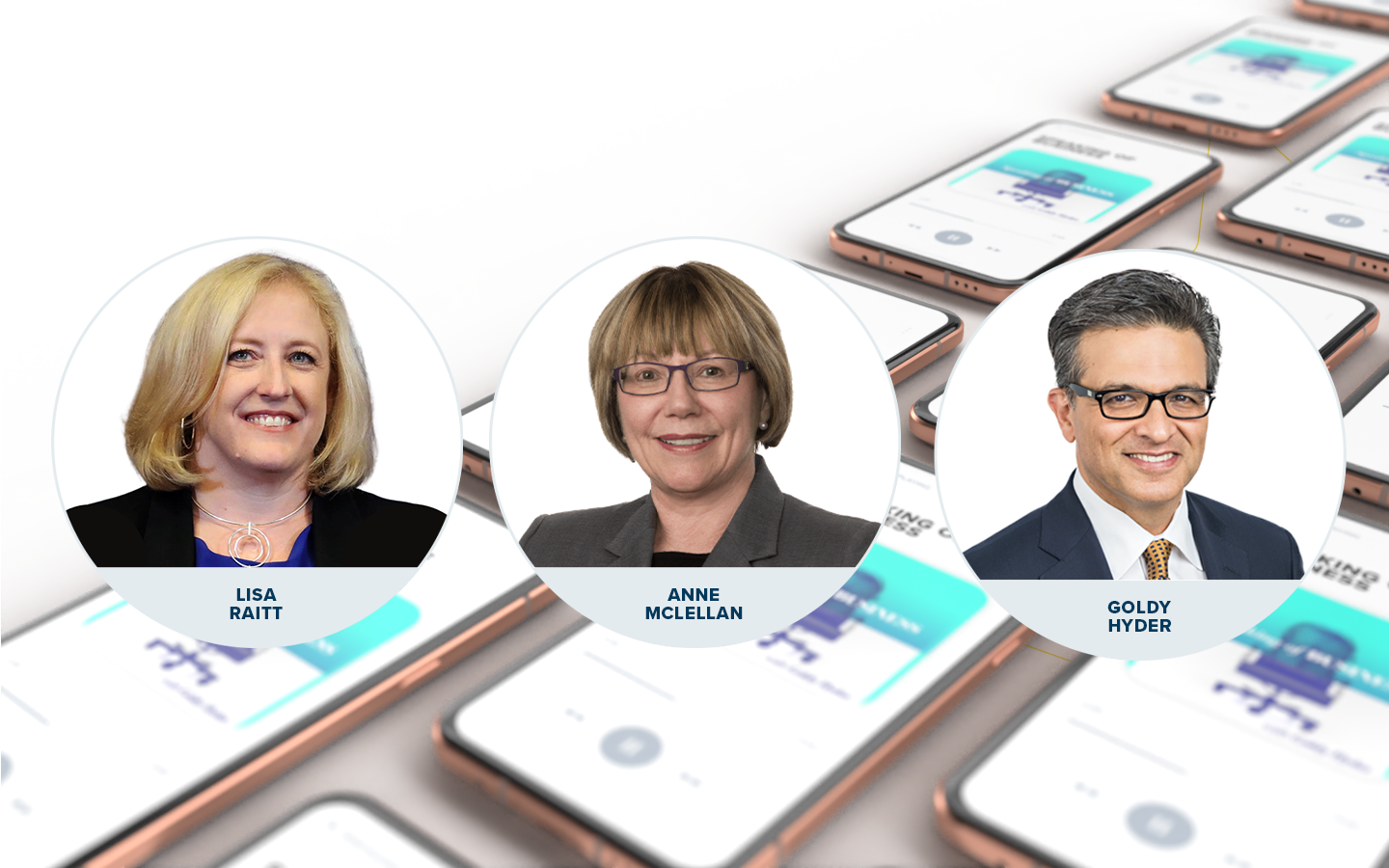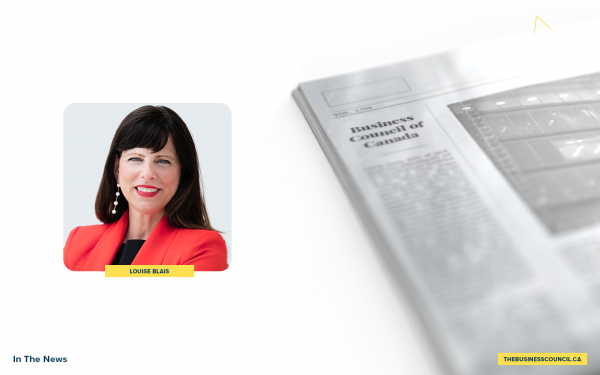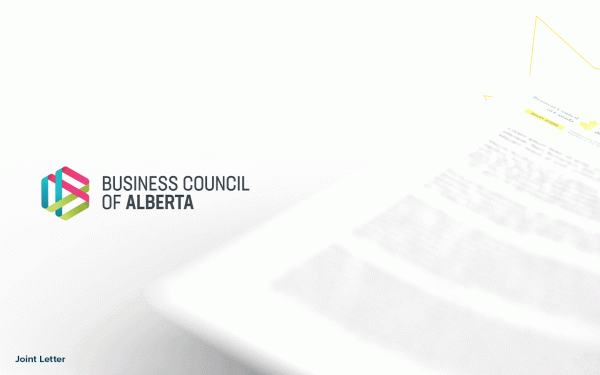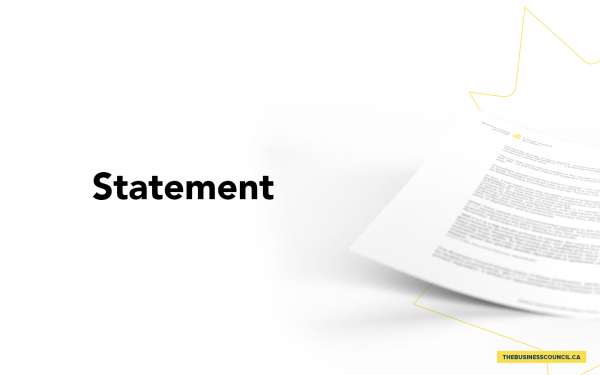Searching for common ground: teaming up to address Canada’s economic future
Lisa Raitt and Anne McLellan know first-hand the challenges of governing in a minority parliament. They both served as cabinet ministers in minority governments – Raitt as a Conservative and McLellan as a Liberal.
“Long term planning is harder,” McLellan told Goldy Hyder in the Speaking of Business podcast, “but that doesn’t mean you can’t get big things done. It actually requires you to make common cause with your fellow parliamentarians across the aisle … issue by issue the governing party has to find its support.”
With a new minority parliament set to assemble in Ottawa, the two former politicians are searching for common ground. They are co-chairs of a new initiative aimed at developing a long-term vision for Canada.
The Coalition for a Better Future brings together more than 100 organizations across the private and not-for-profit sectors. Their goal? To help shape a plan for long-term inclusive, sustainable economic growth.
Raitt and McLellan know finding common ground among a wide range of interests won’t be easy. But they both see the need to give it a try.
“There’s big change happening around us and we really need to be ready for it,” says Raitt. “And if part of being ready is making sure that we can scoop up as many voices in society to give an idea of what economic growth they think is needed, then I think that’s going to be a very worthwhile experiment and one that will be welcomed.”
Listen to Goldy Hyder’s full conversation with Anne McLellan and Lisa Raitt.
Latest Podcasts
Transcript
Lisa Raitt:
There’s big change happening around us, and we really need to be ready for it. And if part of being ready for it, is making sure that we can scoop up as many voices in society to give an idea of what they think on economic growth is needed. Then I think that’s going to be a very worthwhile experiment, and one that will be welcomed.
Anne McLellan:
So, let’s all work together to try and make sure we put that frame, or pieces together, so we can all get on with this. We can all get to net zero. We can create prosperity and be an inclusive society.
Goldy Hyder:
Welcome to Speaking of Business. I’m Goldy Hyder, president and CEO of the Business Council of Canada. We’re launching a new season of the podcast today, at a pivotal moment for Canada. Just a few weeks ago, Canadians voted in the country’s 44th general election. New parliamentarians will soon be coming to Ottawa with some mighty challenges to tackle. Not the least of which, beating back COVID-19, realizing our climate change ambitions, addressing inequality and Indigenous reconciliation, as well as ensuring that the Canadian economy grows stronger in the months and years to come. That challenge of economic growth will be a theme for us on the podcast over the next few months.
Goldy Hyder:
And to kick things off, I’m very pleased to be joined by two very insightful leaders. Anne McClellan is a former federal liberal cabinet minister, now Canadian and international strategic planning advisor with Bennett Jones. Lisa Raitt is a former federal conservative cabinet minister, now vice-chair of global investment banking with CIBC. Lisa and Anne are also co-chairs of a new initiative, The Coalition for a Better Future. It aims to bring together people from a wide swath of Canadian society, business leaders, community organizations, Indigenous groups, public policy researchers, and many more. They have come together to discuss Canada’s economic growth and the role it can play in addressing some of the biggest challenges of our time. Anne, Lisa, I’m just thrilled to welcome the both of you to the podcast.
Anne McLellan:
Happy to be here.
Lisa Raitt:
It’s great to be here, Goldy. Thanks for asking.
Goldy Hyder:
Well, look, speaking of asking, I called you guys in the summer and I said… And this is really in full disclosure to our audience here … I said, “Listen, I’d love to talk to you about Canada and the future of this country.” And luckily, you didn’t hang up on me, but I’m not surprised because you’re two people who care about this country as much as anyone else. And I asked you whether you would consider being co-chairs of a new coalition, that I referenced, The Coalition for a Better Future. And you two are amongst the busiest people in the country. And so, I’m wondering, why did you say yes?
Anne McLellan:
I said yes, because I think the economic future of the country is pretty important. And, I know that there will be challenges. Growth was slowing pre-COVID. We’re not exactly sure when COVID ends, what the recovery should look like, needs to look like. And, we have, I would say, a bunch of challenges going forward as a nation. So, I think, why not get involved, in terms of creating a better future?
Lisa Raitt:
And I said yes, Goldy, because if you recall, you and I know each other, because you played in a basketball tournament in Cape Breton called The Coal Bowl Classic. And we have often talked about that. And for me, Cape Breton is a really good example of what happens when you don’t have a master plan, and you’re transitioning your economy. And I lived it through the 70s and 80s, and Anne knows full well what it was like, because she was a cabinet minister during the time, trying to deal with some serious economic issues, in a part of the world where I think a plan would’ve been helpful. But, all we can do is we can make sure we don’t repeat the same mistakes. And I thought you had a very intriguing opportunity. So, I was more than happy. And then, you told me Anne was involved. So, there’s that.
Anne McLellan:
And you told me Lisa was involved, so.
Goldy Hyder:
That was the way to seal the deal. Well look, thank you. Thank you for agreeing to do it. Tell me a little bit about why you think the coalition is an important exercise. What is it about this approach? How does it set itself apart differently than whatever we tried before?
Anne McLellan:
Well, I guess from my perspective, the whole idea of a coalition, bringing together a diverse group of organizations, of interests, right? So that we have… Yes, we have big business, we have small business, we have individual entrepreneurs, we have entities like Black North and the Black Chamber of Commerce. We have many Aboriginal organizations. And, I think what that coalition speaks to is a palpable sense that there isn’t something we can identify as a plan going forward, around economic growth. And all these groups who are in different places along the economic continuum, all want to have voice, and they believe they have a piece of the economic growth story, and they want a place to be able to put their piece of that story on the table, and have it listened to.
Lisa Raitt:
Yep. And building on what Anne said, for me, Goldy, it’s the fact that coalition members understand that we’re going to leave at the door, our own personal points of view when it comes to what you’re trying to get out of the plan that we’re putting together. And instead, thinking in big terms of what’s good for the country. And that really appealed to me. And that’s why it’s different, because this time it’s not just a bunch of stakeholders sitting around saying, “This is what I need. This is what I need.” It’s people saying, “Okay, I know what I know. And here’s what I think we should all do together.”
Goldy Hyder:
Our politics, which, you’ve both had, literally, front row seats at, has evolved and it’s changed. And I’m wondering whether in some ways this coalition is a response to how difficult it’s becoming to govern. And, we expect our governments to do everything. The advent of social media, the environment in which we’re operating, the polarization. Are you glad you did politics when you did? Or is it tougher today than it was when you were there?
Anne McLellan:
Well, I guess in comparison to Lisa and myself, I’m the elder here. And in fact, Lisa had to deal with some of the impacts of social media, and I’ll let her refer to those. I was in Ottawa from ’93 to ’06, actually. Sure, there were issues. There was obviously partisanship. Politics has to be about partisanship or at least competing points of view about what the public or common good is. But, there’s no question I think… And especially for women, I have a sense that because of the advent of social media, there is a fractiousness. Dare I say, even an ugliness at times that social media has allowed, because people can be anonymous. When I was in public life, people either had to sign a letter to the editor, they had to walk through my constituency door and identify themselves. It was very hard for them to hide, if they wanted to be unkind, let me put it that way. And, I think that, that led to a somewhat kinder, gentle tone in public life. When you had to take ownership of what you were going to say. I think today it’s become much harder.
Goldy Hyder:
Lisa?
Lisa Raitt:
So, I was in Ottawa from ’08 to ’15. And, for the first couple of years we didn’t have Twitter, and we didn’t have a lot of social media. You had blogs, but that’s about it. By the time we got to the election in ’11, Twitter was in full force. And, it really does have that instantaneous impact on a news cycle for the day. And you have to be reactionary to almost anything that comes out, without it even being supported by any true evidence. You’re just responding to an allegation. And that’s really a big change in politics. As Anne points out, what a difference, having to write a letter to the editor, as compared to somebody just making stuff up and leveling the accusation.
Lisa Raitt:
And Goldy, I would just point out, I mean, we’re taping this today, and we just saw the resignation of Annamie Paul, as the leader of the Green Party. And, talk about a lesson and a sign to normal people out there of why you don’t get involved in politics. That’s a sad state of affairs, because she said, it’s the hardest thing she ever did. She never wants to do it again. All she ever wanted to do was change policy and help the world. And, guess what? “Worst experience of her life” was the quote.
Goldy Hyder:
The reason I asked this question was because the advent of this environment in which we live has changed the way governors go about governing. It’s always been about re-elections. I don’t think that’s a breaking news story here. But it seems to me that the hard part of governing today is really looking past the short-term. And it’s particularly so, when you’ve had five minority parliaments out of the last seven elections. And so, I’m wondering if the system is built to accommodate long-term thinking, which is so key to the coalition that you’re a co-chairing.
Anne McLellan:
Well, long term planning is harder, if you are in a minority government situation, right? I was part of the Paul Martin minority government from ’04 to ’06. But that doesn’t mean you can’t get big things done or certainly try to do big things. And I think Lisa would probably say the Harper minority governments also had big things that they wanted to try and get done. In a strange way, it actually requires you to make common cause with your fellow parliamentarians across the aisle, right? You find your support. We, in this country very rarely have formal coalitions. So, issue by issue, the governing party has to find its support. So, we found our support from the New Democrats, we found our support from the Bloc. And on some issues we found our support from the Conservatives, right? And, it actually, in some strange ways, puts a premium on getting to know your colleagues and trying to work across party lines. And my view, that’s not going to change. We’re a multiparty system, and I think we’re going to stay a multiparty system for the foreseeable future.
Lisa Raitt:
I completely agree with Anne, and I would just add that if I had one wish, it would be that minority governments embrace what Canadians have given you. And, you decide that you are going to actually try to govern and get your agenda passed, instead of wondering when the next election is going to be. Because they can be successful governments, Anne sat in a couple successful ones that were minorities. I sat in a successful one between ’08 and ’11.
Anne McLellan:
And I actually think, Goldy, that we may have to get used to a situation where we see more minority governments. Maybe they become the norm going forward. We have what? Five parties now. And, I think none of them have any plans to disappear. And actually, if you did do some form of electoral reform, and I’m not suggesting we do, I’m not a fan. But, if we were to do some form of electoral reform, it’s only going to empower the smaller parties, probably, not make them less powerful.
Lisa Raitt:
Yep.
Anne McLellan:
So, maybe the people who get elected are going to have to take on board that they are going to have to work across the aisle. As we say in parliament, and compromise, and see ultimately… And maybe that leads to something that is more reflective of the public good.
Lisa Raitt:
Yep.
Goldy Hyder:
But it perhaps also speaks to… And the reason I asked this is to put the environmental context around the purpose of the coalition, the need for the coalition. Some have said, “The audacity of these two co-chairs and their members to think that they should be defining the long-term economic growth.” That’s hardly the case, but is it not necessary that in that environment, in that political backdrop that you’ve described, that one of the ways to help our governments is to do the heavy lifting of bringing people together of civil society, of business, of academia to help find common ground, because it’s so hard to find in politics now?
Lisa Raitt:
I think, there’s no question that, there’s going to be a large burden on the policy makers in Ottawa, both the bureaucratic side and the political side to get things done. And maybe what the unsettling thing for me and the reason why I really believe in this coalition and the work that it’s going to do is because you can feel that there is some significant change happening around us. And, knowing that, that change is happening, you have to do something about it. I believe, the parties get that too. All of the parties, their platforms, all reflected the notion that, “There’s big change happening around us and we really need to be ready for it.” And if part of being ready for it, is making sure that we can scoop up as many voices in society to give an idea of what they think on economic growth is needed. Then I think that’s going to be a very worthwhile experiment, and one that will be welcomed by both politicians and by bureaucrats. Because we’re not going to tell them what to do, but we are going to give them some ideas as to what we think.
Goldy Hyder:
Now, Anne, we’ve just come off the election and you’re out west. You and I share the privilege of being Albertans.
Anne McLellan:
Yes.
Goldy Hyder:
And I’m wondering, this election, how much schisms were exposed in it, whether it was urban-rural, whether it was west-east, to some extent French-English, are you at all worried about the country as a whole?
Anne McLellan:
Well, I think as Canadians we’re always worried a little bit, right? I mean, almost all federations by nature have a certain fragility inherent in them. Ours, we’ve obviously seen the Quebec-rest-of-Canada cleavage for some time, two referenda. In ’19, there were no elected representatives from the provinces of Alberta and Saskatchewan in the Government of Canada, that clearly created, I think, anxiety to say the least, Goldy, where you and I were brought up, here in Alberta, but Saskatchewan as well. I do give the government credit for putting in place Jim Carr and making him the minister responsible for the prairies. And I think he did a good job of reaching out. But, that does not replace elected representatives.
Anne McLellan:
This time, it was interesting here in Alberta, because we have elected two New Democrats from the city of Edmonton, and two Liberals, one from Edmonton and one from Calgary. So, that is maybe a little bit of a crack. I think that’s a good thing. And I’m not saying that as a partisan comment. I think that’s a good thing because there are a lot of people in the two big cities, who actually do take a different perspective on some pretty important issues. For example, big cities, both Calgary and Edmonton, much more supportive of the climate change agenda, the challenges of climate change, how we diversify the economy here in Alberta. So, I think probably, if there is a major defining cleavage in Canada, it is not really east-west. It is urban-rural.
Goldy Hyder:
I’ve always believed that. Now, Lisa, you mentioned how proud of a Cape Breton-er you are. How are things out east-east?
Lisa Raitt:
Well, I think what happened in COVID-19 is, the Atlantic provinces really did a good job of protecting themselves and they did it simply by closing their borders. And as a result, their economies have suffered and they have very interesting, I think, challenges ahead on their healthcare systems. I don’t think that the Atlantic provinces could have taken many COVID illnesses, or many COVID hospitalizations because of the mere fact, that they do have an under-subscribed number of beds that they would have to have in order to deal with a real large outbreak. And, they struggle when you get into the tens, as opposed to what happens in Ontario or even Alberta. So, I think what Atlanta Canada, it has to do is, it has to actually reopen itself to the rest of the country and reknit those economic ties back together.
Goldy Hyder:
So, we’re having a summit that year of the co-chairs of, on the 27th and 28th of October. And as I’ve mentioned, it’s bringing together a really disparate group of people. And, I’m wondering when you think about what role the business community… Which you both now belong to in addition to your political careers, what role do you see business having in some of the issues that were exposed in the campaign, for example, around affordability, around childcare, around job stagnation, and job creation, paying back the deficit and the debt. There used to be a real separation, if you will, between church and state business, you do what you do, government, you do what you do. And every once in a while, we might either disagree or agree on something. Do you think things have changed now, as a result of where we are, $350 billion in deficit, $1.3 trillion in debt. And, a world that’s very different than when COVID started a year and a half ago. Is there something different going on here that gives you some hope?
Lisa Raitt:
For me, it does. I don’t know if I have hope about it. I have great concerns about it. I think that private sector is going to have to get more involved, because they’re experiencing the impacts of public policy that’s not working on those bigger picture things. I’ll give you an example of affordable housing. Affordable housing as a big picture is something that the federal government can easily say, “That’s a provincial matter. It’s not a federal matter.” And the private corporations can say, “Well, it’s not really us, because we don’t deal with that.”
Lisa Raitt:
But here’s the problem. When you have people who are commuting from Windsor, Ontario to Mississauga, to work in large warehouses, because they can’t afford to live in the ring of housing around the 905. Then we have a real problem, in terms of people being able to have labour mobility. And, for companies to be able to tap in to labour itself, or have those workers that they’re going to need in those businesses. So, that’s huge problem. And, you would never think that it involves policies around affordable housing, but it does. So, private sector has to get their head around it.
Anne McLellan:
I think, government can only do so much. I see government providing the framework for economic growth. And, when I say government, governments, right? Because I actually think it’s not just the Government of Canada, it’s provincial, territorial, and municipal governments, when you think about how important those major urban, metropolitan areas are in the wellbeing of both economic and otherwise of Canadian citizens. So, I think any animosity… And there’s always going to be some tension. Business will always want something that government doesn’t want to give, because government may have a different vision of what the appropriate public policy should be, or the balance, or they may want a little bit more from the private sector. I mean, these conversations go on all the time.
Anne McLellan:
But I do think that if we’re going to be competitive out to 2050, which is the benchmark now we’ve put ourselves in, right? Net zero, 2050. I don’t know many private sector companies that do not want to exist in 2050. So, they’re starting to think about, “What do I need to do? What do we need to do as a company and a board of directors to be sustainable in 2030, in 2050.” And, business wants and will need government to help put the framework in place with some certainty, right? Because, right now business is asking, “We can deal with almost any rule of the game, as long as it’s reasonable. And we know 2050, net zero, we are ready to do our part. But, there’s some pieces governments that you have, that we need to know about now. So, let’s all work together to try and make sure we put that frame, or pieces together, so we can all get on with this. We can all get to net zero. We can create prosperity and be an inclusive society.”
Goldy Hyder:
And I’m coming to you Lisa with this first, but both of you have been ministers of natural resources. You know how important Canada’s natural resources economy is. Lisa, in terms of this energy transition, what some are calling a just transition, how challenging will it be for Canada, given the reliance on natural resources?
Lisa Raitt:
Well, I think you should have started with Anne because she has a much greater depth of knowledge to what I’m about to say, which is, the folks out in the oil sands and the oil patch have made a determination that they want to be around in 2050, and they are charting their pathway to net zero. And I take my hat off to them, I think this is exactly the thing that you need to see private sector doing, which is involving themselves in discussions of policy at the government, so that they have some control over what the outcomes are going to be in terms of policy.
Lisa Raitt:
If you let government be in a vacuum, I mean, we’re going to operate in a vacuum. That’s just the reality, you need to have that input. So, I think that’s incredibly important. I would also make the distinction too, that there’s a difference between reducing emissions and reducing production. You can reduce emissions without reducing production, if you get the science right. And I think we have to make sure that, in order to keep wealth accumulation happening, that we do the best job we possibly can for the provinces that are dependent upon oil and gas, and that’s Alberta, Saskatchewan, and Newfoundland and Labrador.
Goldy Hyder:
Well, Lisa, your boss, the CEO of CIBC, has called it, “The family business.” Anne, what do you think?
Anne McLellan:
Well, I think the family business is going to be with us a long time, but it’s going to look an awful lot different, right? It has to. And that’s why as Lisa’s reference to big five in the oil sands, have made a commitment to net zero, 2050, and they’re right now working on their plans as companies, as to what they need to do to get there, what investments they have to make in research and development, in clean tech application. Well, they’re also quite rightly looking to their provincial and federal governments for incentives, right? Because, this is going to be a heavy lift to get to 2050. And, we are going to need as much energy in 2050 as we use today. The mix is going to look, I think quite a bit different. But, having said that these companies are planning and starting to plan for what they need.
Anne McLellan:
But, if you looked at the last budget, consultations around an investment tax credit.
Goldy Hyder:
Mm-hmm (affirmative).
Anne McLellan:
Something equivalent to the U.S. Tax Code 45Q, whether it’s similar or not, consultations are going on. But that’s an important part of the piece, net zero accelerator, right? Billions of dollars there, provided by the Government of Canada. And in some cases, provinces will step up and they will participate in those projects. What are they all leading to? They’re all leading to the development of technology and the application of technology, so that blue and green hydrogen become an important part of the energy mix. Small modular reactors, in the nuclear space, electrification of the grid, electric cars.
Goldy Hyder:
Carbon capture. Yeah.
Anne McLellan:
All these things. And look, the forestry sector can be a part of the solution here. And, the mining sector can be part of the solution, because Canada has a wealth of critical minerals.
Lisa Raitt:
Yeah.
Anne McLellan:
And we will mine those critical minerals. And they are needed for electric vehicles and other things. So, we can use and exploit this amazing natural resource wealth. We just have to figure out better ways to do it with the private sector and governments working together.
Goldy Hyder:
Now, some would say part of the problem here is the emergence of a stakeholder capitalism. Now you’re both, as I said, in the private sector, and Lisa given you’re in investment banking and stuff, you’re seeing this. From the perspective of everything you’ve just talked about, requires capital. If there isn’t the sufficient capital forming to bring about that innovation, human behavior alone, and all the target setting is not going to change that. So, are we having the right conversation on the climate, or has this issue been just politicized to such an extent that you can’t have that conversation?
Lisa Raitt:
I think we’re having the conversation. I think, it’s the right conversation. And, I’m glad to see that banks, insurance companies, and asset managers are all involved in taking a look at where they want to deploy their capital, and who they want to deploy it to. I think that is the final push in getting us to the place where we want to be, which is to have less emissions, and a good climate strategy, and good economic growth to go with it. So, I’m glad that they’re there. I’m glad that we’re seeing some leadership. I watched this morning, my boss, Victor Dodig at CIBC interview Alison Rose, who’s the CEO of NatWest, over in the UK. And, they’re putting together 900 of their own charging parking spots at their NatWest branches across the country. And that’s amazing. And, those are the things that larger institutions, private sector, are going to be doing, I think. And I think it’s the right conversation.
Anne McLellan:
Yeah. I agree with Lisa. The conversation is ongoing. People, Goldy, have always had a choice, in terms of where they put their money. Right? And the rate of return that they want and the kind of return that they want on their money. Mostly, we think in terms of dividends, and actual dollars, and cents, but more and more people are now starting to think about investing their money, and yes, getting a dividend, that’s a dollar and a cent, but also social goods, and in return. So, we have to start looking at dividends in a much different way, or at least a broader way. And, look, the other thing I would say is look at the private sector, look at where the big banks, on their asset management side, look at BlackRock. BlackRock has under investment $8 trillion on any given day. That represents more money than 80% of the world’s economies.
Anne McLellan:
If you don’t think BlackRock, if they decide to move that money in a certain way, can change outcomes, can decide the futures of even some of the biggest companies, look what they did to Exxon this spring, right? They got behind the tiny activist shareholder, and all of a sudden, Exxon has three activists on their board, right? So, people are making choices. They’re making different choices perhaps than they did 20, 30, 40 years ago, because the issues are different. So, they’re making choices on the basis of what they want for the climate. They’re making choices on the basis of what they want, for equity, for diversity, for inclusion, for the health, mental and physical of workers around the world, right? And, I think that’s all good. It doesn’t make life easier for boards of directors, and businesses, but I think it’s good, because we’re identifying what the big global and domestic issues are, and that’s where the money’s going, and that’s where the money should go.
Goldy Hyder:
Yeah. I must say having the chance to interact with so many across this country, it’s just become obvious that the right thing to do, is the right thing to do. And more of that is happening. So, let me come to a close here, by coming back to the coalition, because I think what we’ve just done for our audience here is give them an expose about the complexity of the issues, the importance of the issues, the need for leadership, the need for partnership, between different elements of society. And, Anne you’ve joked before that, these conversations are probably going to be messy.
Anne McLellan:
Yeah.
Goldy Hyder:
They’re probably going to be uncomfortable. How do you think both of you, and the advisory committee, and the summit itself, do you think you can find the common ground, as disparate as this group of people are?
Anne McLellan:
Well, we’re going to find out aren’t we? And look-
Goldy Hyder:
I’ll take that as a, “Yes, we should be able to do it.”
Anne McLellan:
I’m not trying to be flippant here, but I don’t think we know, right Lisa?
Lisa Raitt:
Yeah.
Anne McLellan:
We’re hoping. And everybody, we believe, we know everybody’s going into this in good faith, and they want the best for their country, they want the best for the organizations and people they represent. And, I would expect that there will be lots of engagement and rigorous and vigorous discussion, as there should be. But, at the end of the day, I’m hoping that we are able to come together around a scorecard, where we have identified major themes. And then, drilling down some benchmarks, some metrics to which we will then hold each other, and our governments, and the private sector to account. And, I think we can get there. I have to believe we can get there. And those conversations are ongoing. And, we’re reaching out to coalition members, seeking their views. We have different methods by which we are getting input. The thing that amazes me about this, Goldy, is how many people want to participate.
Lisa Raitt:
Yes.
Anne McLellan:
And Lisa, on that note, I’ll turn it over to you.
Lisa Raitt:
Well, I thought you were going to tell the story about how both you and I, after the press release went out, got lots of people calling us saying, “We want to be involved. How do we get involved in that?” And that gives me a lot of hope for what we’re trying to accomplish. And what we’re trying to accomplish, I think Goldy, is pretty simple, which is, just try to put the pieces together, so that as one voice is possible, we can give an idea as to what we are ambitious to do and what we will resolve to do. To quote a friend of ours who wrote a piece on this a couple of days ago.
Lisa Raitt:
And, what strikes me is that when I look at my kids, and they’re about to embark upon their careers, and they are excited for the future, but they know change is coming, but they’re excited. And, I’m farther along in my career and I’m worried. So, I think I need a little bit more of their excitement and I think they need a little bit more of my worry. And the only way that happens is if we bring together a big group of people to have that conversation, and to come up with an idea of how we want to move forward together, at least providing a forum for it, where there’s no partisan politics involved. And we’re all on the same page, which is just a better Canada.
Goldy Hyder:
I can’t think of a better place to wrap than that. That’s a good spot to end Lisa and Anne. I just thank you so much for joining us and for sharing your passion for this country, but also your vision for what we can be.
Anne McLellan:
Thank you. My pleasure.
Lisa Raitt:
Thank you, Goldy.
Goldy Hyder:
Former cabinet ministers Anne McClellan and Lisa Raitt are co-chairs of the newly formed Coalition for a Better Future. If you would like to learn more about at the coalition, you can check out the website at canadacoalition.ca. Now, I mentioned that we’re going to be exploring different aspects of economic growth over the coming season of Speaking of Business. And I really hope you’ll join me for that journey. The best way to do that is to subscribe to our podcast. Search for, Speaking of Business wherever you get your podcasts, or simply go to our website at thebusinesscouncil.ca, that’s thebusinesscouncil.ca. I’m Goldy Hyder. Thanks for joining us.










